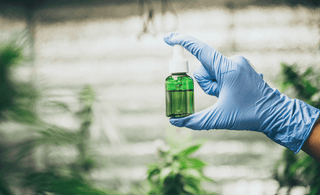Cannabichromene (CBC) is one of over a hundred cannabinoids produced in the hemp plant. CBC Oil interacts with the endocannabinoid system to support homeostasis in the body. Some people might not know about it because it's not as well researched as CBD or THC, but that doesn't mean it isn't worth exploring.
CBC and other cannabinoids are extracted and concentrated as ingredients for products to harness the cannabis plant's potential wellness benefits in easier-to-use formats.
Benefits Of CBC Cannabichromene
CBC benefits include supporting skin health, potentially reducing acne, aiding in pain relief, and promoting healthy brain function. It may also help elevate mood when combined with other cannabinoids.
1. CBC May Have Benefits Towards Problem Skin
Cannabinoids are an incredibly versatile ingredient that can be used both topically and internally.
CBC has been shown to have strong topical applications in skincare products, which may help to support breakouts caused by bacteria and mild inflammation [3]. While CBC does show promising effects towards acne, it's unlikely that CBC will replace CBD in this department since its actions aren't as strong, and it's much more difficult to harvest.
Rather than reaching for a CBC isolate product to tackle skin concerns, experts believe that CBC can provide more benefits towards supporting normal inflammation when combined with cannabinoids like THC and CBD in a full spectrum or broad spectrum extract.
CBD has become very popular in the skincare space for its interaction with the endocannabinoid system in skin tissues to support normal sebum (oil) production [4].
2. CBC May Inhibit Cancer Cell Growth (In Pre-Clinical Studies)
In rodent-modeled studies, cannabichromene has been observed to activate cell death (apoptosis) of tumor cells, limiting the spread and proliferation of cancerous cells [5].
In these studies, it's theorized that cannabinoids also target key signaling pathways involved with cancer, such as pain, nausea, and vomiting, which may help to ease overall discomfort from the disease [3].
Even in the studies looking at CBC's potential for cancer treatments, researchers concluded that CBC is much more effective alongside THC and CBD than it is on its own.
3. CBC May Support Healthy Brain Function
A study aimed at the effects of cannabinoids on adult neural stem progenitor cells (NSPCs)—brain, retina, and spinal cord stem cells—found that cannabichromene (CBC) has a positive effect on mouses in vitro [6].
This study concluded that the presence of CBC helped NSPCs differentiate into astroglial cells, which are the most abundant cell type in the central nervous system (CNS), and perform a variety of tasks including maintaining homeostasis and healthy brain function.
Because most of the research on cannabinoids is focused on CBD and THC, there's still a lot we don't know about CBC, how it works, and its proven benefits, but we can have a look at some of the limited studies.
CBC May Have Potential For Pain Relief
While there hasn't been any studies specifically looking at CBC on its own, it seems like CBC works well with other cannabinoids like THC and CBD to modulate some effects in the endocannabinoid system in murine models for chronic pain.
Similar to CBD, CBC has been found to interact with vanilloid receptors (TRPV1) and the CB2 receptors in the immune system, which play a significant role in pain perception and the inflammatory response [2,3].
CBC Has The Potential For Supporting Healthy Brain Cells
Early studies suggest that CBC has neuroprotective properties to support healthy brain function.
One study found that CBC has positive effects on neural stem progenitor cells, which is important in combating neurological diseases like Alzheimer's and dementia [4].
CBC May Have Mood Elevating Properties
One of the many reasons people turn to the hemp plant is for stress management.
It looks like CBC works well with other cannabinoids in supporting mood function and stress through the endocannabinoid system.
The research was conducted on rats, but the results suggest that CBC could have a similar effect on the human body when used in conjunction with CBD [5].
This suggests that the CBC cannabinoid plays an important role in the overall mood elevating properties of the cannabis plant.
CBC May Have Benefits For Skin Health
CBC may also help against acne.
Acne is caused by a buildup of sebum, an oily substance produced by the sebaceous glands in the skin tissue. Sebum can block pores and trap bacteria, leading to inflammation and breakouts.
Studies suggest that CBC may help to regulate sebum production by supporting the endocannabinoid system, making it a potential treatment for acne [6]. However, more research is needed to confirm these effects.
CBC Benefits Chart

How Does CBC Work?
Cannabinoids like CBC, CBD, and THC interact with the endocannabinoid system (ECS), specifically cannabinoid receptors, to maintain the internal homeostasis of vital functions, including the sleep-wake cycle, hormones, energy metabolism, stress, and inflammation [1].
Unlike THC, CBC does not seem to produce any psychoactive effects. Instead, it appears to interact with other cannabinoids to enhance their effectiveness through the entourage effect.

CBC Vs. CBD: What's The Difference?
CBD and CBC lie in their concentrations in the cannabis plant, their slight molecular composition, the amount of research conducted on them, and the product availability.
For starters, CBD or cannabidiol is the most abundant cannabinoid found in hemp plants.
If you've ever taken full spectrum CBD, chances are you've already experienced the benefits of CBC through the entourage effect.
The entourage effect describes when naturally occurring cannabis compounds work synergistically to offer more pronounced benefits in the endocannabinoid system than any of the primary cannabinoids can do on their own.
Even in the studies we've outlined above, most of the general cannabinoid science around CBC finds that its most effective when combined with either THC or CBD.
While CBD is widely recognized for its calming effects and potential sleep benefits, CBC's impact on relaxation is less studied.
How To Use CBC
The cannabis sativa plant contains a wealth of beneficial compounds, which is why it's one of the oldest medicinal plants.
The fastest way to feel the effects of your CBC product is to administer the dose sublingually.
Under the tongue, there's a mucous membrane lined with micro-capillaries that can deliver the active compounds into the bloodstream much faster than through the digestive system.
The effects of CBC should take effect anywhere between 30–45 minutes, depending on your metabolism and the dose you take.
Most people will find that taking CBC regularly is the best way to reap the benefits. This is because it can take several days for the endocannabinoid system to adjust to the supplemented cannabinoids.
How To Store Your CBC
Cannabinoids are sensitive to UV light and heat—so keep make sure your CBC product comes in an air-tight amber glass container to protect the cannabinoids from degrading and store it away from direct sunlight and heat.
The carrier oil should serve as a good base to keep the cannabinoids and terpenes fresh for at least 18 months.
What can you expect from CBC?
CBC or cannabichromene is a naturally occurring cannabinoid found in the hemp plants. It's the third most abundant cannabinoid, and there's some early research to suggest it has some health benefits.
Many cannabinoids are believed to hold anti-inflammatory properties through their interactions with the endocannabinoid system, making them promising compounds for use with chronic pain and brain health.
While the research on CBC is limited, it has been suggested to provide support for the main cannabinoids THC and CBD for supporting neurological health, skin health, and pain relief—but the studies are mostly conducted on animals and there has yet to be human clinical trials that showcase its safety and effectiveness.
Further research is needed to show the true potential of this cannabinoid, but these early results are promising.
If you're looking to try CBC for yourself, it's important that you shop from reputable online CBD brands that can provide you with details about their hemp sourcing, extraction methods, and third-party lab tests to verify the quality and safety of the products.
Resources:
-
Zou, S., & Kumar, U. (2018). Cannabinoid receptors and the endocannabinoid system: signaling and function in the central nervous system. International journal of molecular sciences, 19(3), 833.
-
DeLong, G. T., Wolf, C. E., Poklis, A., & Lichtman, A. H. (2010). Pharmacological evaluation of the natural constituent of Cannabis sativa, cannabichromene and its modulation by Δ9-tetrahydrocannabinol. Drug and alcohol dependence, 112(1-2), 126-133.
-
Maione, S., Piscitelli, F., Gatta, L., Vita, D., De Petrocellis, L., Palazzo, E., ... & Di Marzo, V. (2011). Non‐psychoactive cannabinoids modulate the descending pathway of antinociception in anaesthetized rats through several mechanisms of action. British journal of pharmacology, 162(3), 584-596.Chicago
-
Shinjyo, N., & Di Marzo, V. (2013). The effect of cannabichromene on adult neural stem/progenitor cells. Neurochemistry international, 63(5), 432-437.
-
El-Alfy, A. T., Ivey, K., Robinson, K., Ahmed, S., Radwan, M., Slade, D., ... & Ross, S. (2010). Antidepressant-like effect of Δ9-tetrahydrocannabinol and other cannabinoids isolated from Cannabis sativa L. Pharmacology Biochemistry and Behavior, 95(4), 434-442.


